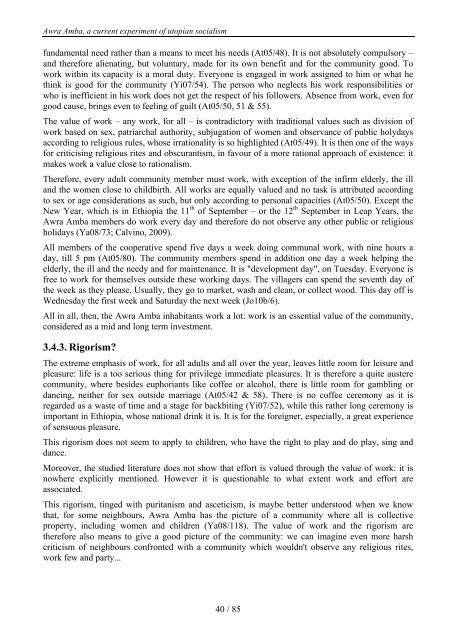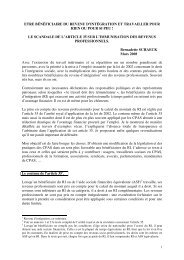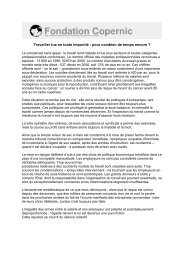Awra Amba RJ 300612 EN - Contacter un comité local d'Attac
Awra Amba RJ 300612 EN - Contacter un comité local d'Attac
Awra Amba RJ 300612 EN - Contacter un comité local d'Attac
You also want an ePaper? Increase the reach of your titles
YUMPU automatically turns print PDFs into web optimized ePapers that Google loves.
<strong>Awra</strong> <strong>Amba</strong>, a current experiment of utopian socialism<br />
f<strong>un</strong>damental need rather than a means to meet his needs (At05/48). It is not absolutely compulsory –<br />
and therefore alienating, but vol<strong>un</strong>tary, made for its own benefit and for the comm<strong>un</strong>ity good. To<br />
work within its capacity is a moral duty. Everyone is engaged in work assigned to him or what he<br />
think is good for the comm<strong>un</strong>ity (Yi07/54). The person who neglects his work responsibilities or<br />
who is inefficient in his work does not get the respect of his followers. Absence from work, even for<br />
good cause, brings even to feeling of guilt (At05/50, 51 & 55).<br />
The value of work – any work, for all – is contradictory with traditional values such as division of<br />
work based on sex, patriarchal authority, subjugation of women and observance of public holydays<br />
according to religious rules, whose irrationality is so highlighted (At05/49). It is then one of the ways<br />
for criticising religious rites and obscurantism, in favour of a more rational approach of existence: it<br />
makes work a value close to rationalism.<br />
Therefore, every adult comm<strong>un</strong>ity member must work, with exception of the infirm elderly, the ill<br />
and the women close to childbirth. All works are equally valued and no task is attributed according<br />
to sex or age considerations as such, but only according to personal capacities (At05/50). Except the<br />
New Year, which is in Ethiopia the 11 th of September – or the 12 th September in Leap Years, the<br />
<strong>Awra</strong> <strong>Amba</strong> members do work every day and therefore do not observe any other public or religious<br />
holidays (Ya08/73; Calvino, 2009).<br />
All members of the cooperative spend five days a week doing comm<strong>un</strong>al work, with nine hours a<br />
day, till 5 pm (At05/80). The comm<strong>un</strong>ity members spend in addition one day a week helping the<br />
elderly, the ill and the needy and for maintenance. It is "development day", on Tuesday. Everyone is<br />
free to work for themselves outside these working days. The villagers can spend the seventh day of<br />
the week as they please. Usually, they go to market, wash and clean, or collect wood. This day off is<br />
Wednesday the first week and Saturday the next week (Jo10b/6).<br />
All in all, then, the <strong>Awra</strong> <strong>Amba</strong> inhabitants work a lot: work is an essential value of the comm<strong>un</strong>ity,<br />
considered as a mid and long term investment.<br />
3.4.3. Rigorism?<br />
The extreme emphasis of work, for all adults and all over the year, leaves little room for leisure and<br />
pleasure: life is a too serious thing for privilege immediate pleasures. It is therefore a quite austere<br />
comm<strong>un</strong>ity, where besides euphoriants like coffee or alcohol, there is little room for gambling or<br />
dancing, neither for sex outside marriage (At05/42 & 58). There is no coffee ceremony as it is<br />
regarded as a waste of time and a stage for backbiting (Yi07/52), while this rather long ceremony is<br />
important in Ethiopia, whose national drink it is. It is for the foreigner, especially, a great experience<br />
of sensuous pleasure.<br />
This rigorism does not seem to apply to children, who have the right to play and do play, sing and<br />
dance.<br />
Moreover, the studied literature does not show that effort is valued through the value of work: it is<br />
nowhere explicitly mentioned. However it is questionable to what extent work and effort are<br />
associated.<br />
This rigorism, tinged with puritanism and asceticism, is maybe better <strong>un</strong>derstood when we know<br />
that, for some neighbours, <strong>Awra</strong> <strong>Amba</strong> has the picture of a comm<strong>un</strong>ity where all is collective<br />
property, including women and children (Ya08/118). The value of work and the rigorism are<br />
therefore also means to give a good picture of the comm<strong>un</strong>ity: we can imagine even more harsh<br />
criticism of neighbours confronted with a comm<strong>un</strong>ity which wouldn't observe any religious rites,<br />
work few and party...<br />
40 / 85

















